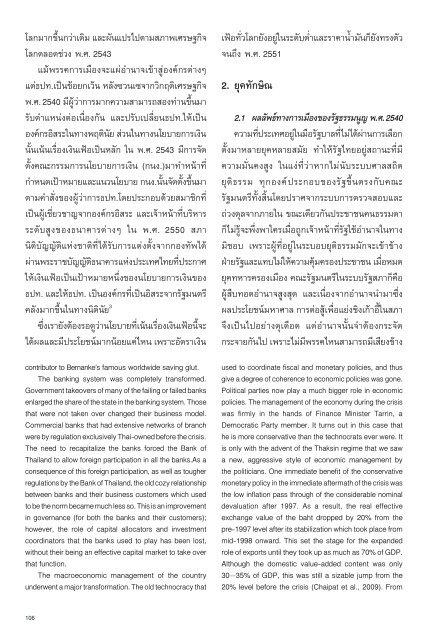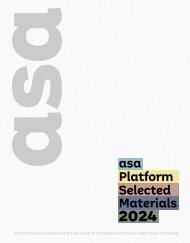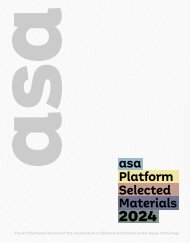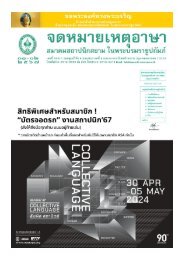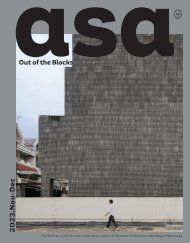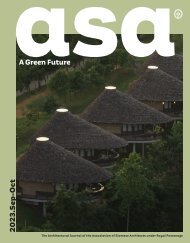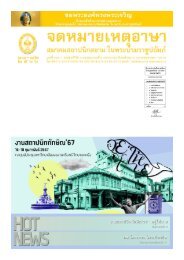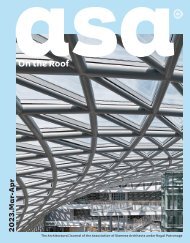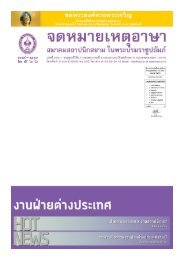บ้านเรือนถิ่นไทยในช่วงเจ็ดทศวรรษ 2489-2559
Create successful ePaper yourself
Turn your PDF publications into a flip-book with our unique Google optimized e-Paper software.
่<br />
โลกมากขึ้นกว่าเดิม และผันแปรไปตามสภาพเศรษฐกิจ<br />
โลกตลอดช่วง พ.ศ. 2543<br />
แม้พรรคการเมืองจะแผ่อำนาจเข้าสู่องค์กรต่างๆ<br />
แต่ธปท.เป็นข้อยกเว้น หลังซวนเซจากวิกฤติเศรษฐกิจ<br />
พ.ศ. 2540 มีผู้ว่าการมากความสามารถสองท่านขึ้นมา<br />
รับตำแหน่งต่อเนื่องกัน และปรับเปลี่ยนธปท.ให้เป็น<br />
องค์กรอิสระในทางพฤตินัย ส่วนในทางนโยบายการเงิน<br />
นั้นเน้นเรื่องเงินเฟ้อเป็นหลัก ใน พ.ศ. 2543 มีการจัด<br />
ตั้งคณะกรรมการนโยบายการเงิน (กนง.)มาทำหน้าที<br />
กำหนดเป้าหมายและแนวนโยบาย กนง.นั้นจัดตั้งขึ้นมา<br />
ตามคำสั่งของผู้ว่าการธปท.โดยประกอบด้วยสมาชิกที่<br />
เป็นผู้เชี่ยวชาญจากองค์กรอิสระ และเจ้าหน้าที่บริหาร<br />
ระดับสูงของธนาคารต่างๆ ใน พ.ศ. 2550 สภา<br />
นิติบัญญัติแห่งชาติที่ได้รับการแต่งตั้งจากกองทัพได้<br />
ผ่านพระราชบัญญัติธนาคารแห่งประเทศไทยที่ประกาศ<br />
ให้เงินเฟ้อเป็นเป้าหมายหนึ่งของนโยบายการเงินของ<br />
ธปท. และให้ธปท. เป็นองค์กรที่เป็นอิสระจากรัฐมนตรี<br />
คลังมากขึ้นในทางนิตินัย 3<br />
ซึ่งเรายังต้องรอดูว่านโยบายที่เน้นเรื่องเงินเฟ้อนี้จะ<br />
ได้ผลและมีประโยชน์มากน้อยแค่ไหน เพราะอัตราเงิน<br />
contributor to Bernanke’s famous worldwide saving glut.<br />
The banking system was completely transformed.<br />
Government takeovers of many of the failing or failed banks<br />
enlarged the share of the state in the banking system. Those<br />
that were not taken over changed their business model.<br />
Commercial banks that had extensive networks of branch<br />
were by regulation exclusively Thai-owned before the crisis.<br />
The need to recapitalize the banks forced the Bank of<br />
Thailand to allow foreign participation in all the banks.As a<br />
consequence of this foreign participation, as well as tougher<br />
regulations by the Bank of Thailand, the old cozy relationship<br />
between banks and their business customers which used<br />
to be the norm became much less so. This is an improvement<br />
in governance (for both the banks and their customers);<br />
however, the role of capital allocators and investment<br />
coordinators that the banks used to play has been lost,<br />
without their being an effective capital market to take over<br />
that function.<br />
The macroeconomic management of the country<br />
underwent a major transformation. The old technocracy that<br />
เฟ้อทั่วโลกยังอยู่ในระดับต่ำและราคาน้ำมันก็ยังทรงตัว<br />
จนถึง พ.ศ. 2551<br />
2. ยุคทักษิณ<br />
2.1 ผลลัพธ์ทางการเมืองของรัฐธรรมนูญ พ.ศ. 2540<br />
ความที่ประเทศอยู่ในมือรัฐบาลที่ไม่ได้ผ่านการเลือก<br />
ตั้งมาหลายยุคหลายสมัย ทำให้รัฐไทยอยู่สถานะที่มี<br />
ความมั่นคงสูง ในแง่ที่ว่าหากไม่นับระบบศาลสถิต<br />
ยุติธรรม ทุกองค์ประกอบของรัฐขึ้นตรงกับคณะ<br />
รัฐมนตรีทั้งสิ้นโดยปราศจากระบบการตรวจสอบและ<br />
ถ่วงดุลจากภายใน ขณะเดียวกันประชาชนคนธรรมดา<br />
ก็ไม่รู้จะพึ่งพาใครเมื่อถูกเจ้าหน้าที่รัฐใช้อำนาจในทาง<br />
มิชอบ เพราะผู้ที่อยู่ในระบอบยุติธรรมมักจะเข้าข้าง<br />
ฝ่ายรัฐและแทบไม่ให้ความคุ้มครองประชาชน เมื่อหมด<br />
ยุคทหารครองเมือง คณะรัฐมนตรีในระบบรัฐสภาก็คือ<br />
ผู้สืบทอดอำนาจสูงสุด และเนื่องจากอำนาจนำมาซึ่ง<br />
ผลประโยชน์มหาศาล การต่อสู้เพื่อแย่งชิงเก้าอี้ในสภา<br />
จึงเป็นไปอย่างดุเดือด แต่อำนาจนั้นจำต้องกระจัด<br />
กระจายกันไป เพราะไม่มีพรรคไหนสามารถมีเสียงข้าง<br />
used to coordinate fiscal and monetary policies, and thus<br />
give a degree of coherence to economic policies was gone.<br />
Political parties now play a much bigger role in economic<br />
policies. The management of the economy during the crisis<br />
was firmly in the hands of Finance Minister Tarrin, a<br />
Democratic Party member. It turns out in this case that<br />
he is more conservative than the technocrats ever were. It<br />
is only with the advent of the Thaksin regime that we saw<br />
a new, aggressive style of economic management by<br />
the politicians. One immediate benefit of the conservative<br />
monetary policy in the immediate aftermath of the crisis was<br />
the low inflation pass through of the considerable nominal<br />
devaluation after 1997. As a result, the real effective<br />
exchange value of the baht dropped by 20% from the<br />
pre-1997 level after its stabilization which took place from<br />
mid-1998 onward. This set the stage for the expanded<br />
role of exports until they took up as much as 70% of GDP.<br />
Although the domestic value-added content was only<br />
30–35% of GDP, this was still a sizable jump from the<br />
20% level before the crisis (Chaipat et al., 2009). From<br />
106


